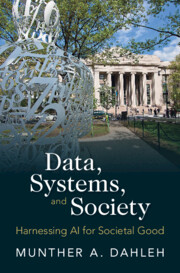Book contents
- Data, Systems, and Society
- Reviews
- Data, Systems, and Society
- Copyright page
- Contents
- Preface
- 1 The Pitfalls, Promises, and Challenges of Data
- 2 A Confluence of Fields
- 3 Who – and What – Should Drive Decision-Making?
- 4 A Transdiscipline Is Born
- 5 Complexity versus Relevance
- 6 The Care and Feeding of a New Discipline at MIT
- 7 People, Programs, and Research
- 8 Personal Reflections on the Journey
- Acknowledgments
- Bibliography
- Index
2 - A Confluence of Fields
Some Historical Perspective
Published online by Cambridge University Press: 24 March 2025
- Data, Systems, and Society
- Reviews
- Data, Systems, and Society
- Copyright page
- Contents
- Preface
- 1 The Pitfalls, Promises, and Challenges of Data
- 2 A Confluence of Fields
- 3 Who – and What – Should Drive Decision-Making?
- 4 A Transdiscipline Is Born
- 5 Complexity versus Relevance
- 6 The Care and Feeding of a New Discipline at MIT
- 7 People, Programs, and Research
- 8 Personal Reflections on the Journey
- Acknowledgments
- Bibliography
- Index
Summary
This chapter asserts that the evolution of AI over the past seven decades has been closely intertwined with advancements in computational power. It identifies four key computing developments – mainframes, personal computers, wireless communication and the internet, and embedded systems – that have significantly influenced the field of data science and AI.
Starting from the early concepts of Turing machines, the chapter traces the parallel evolution of AI through milestones such as the invention of the perceptron, the development of machine learning techniques, and the current state of AI systems. It highlights key moments in AI history, from the first computer to play checkers to the algorithmic triumph of Deep Blue over a chess champion, as well as the recent achievements of AlphaGo.
By placing these advances in the context of broader computing history, the chapter argues that contemporary AI capabilities are the culmination of deliberate and iterative technological progress. It concludes by examining the profound impact of computing and AI on political institutions, citing examples such as the Arab Spring and the Cambridge Analytica scandal.
- Type
- Chapter
- Information
- Data, Systems, and SocietyHarnessing AI for Societal Good, pp. 19 - 40Publisher: Cambridge University PressPrint publication year: 2025

